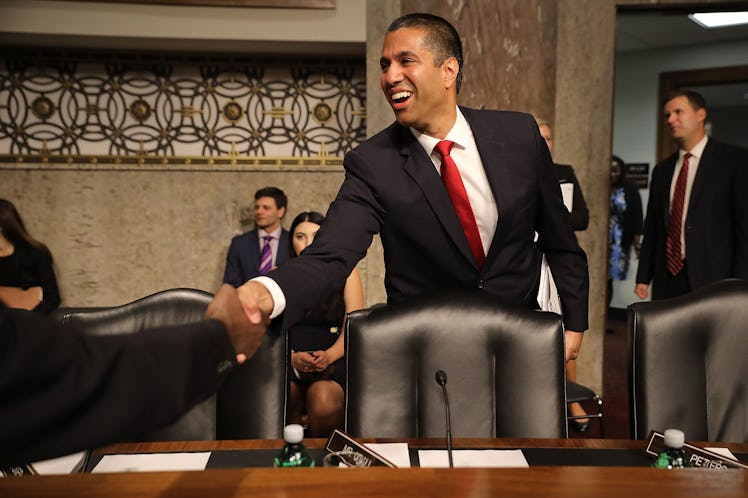
The FCC Voted On Net Neutrality, So Say Goodbye To The Internet As You Know It
On Thursday, Dec. 14, the Federal Communications Commission (FCC) made an official decision on the future of "net neutrality" rules that the commission itself passed two years ago. After a 3-2 vote, the FCC's board of five commissioners approved a plan proposed by chairman Ajit Pai, who aimed at essentially repealing the net neutrality rules. Now that a majority of the board has sided with the plan, the FCC's net neutrality vote means a lot for the future of internet regulations.
What The Vote Means
Undoing the net neutrality regulations means internet service providers (ISPs) are no longer prohibited from either picking and choosing specific types of content to block or from slowing down speeds of different websites and apps in the future. Thursday's vote also means that ISPs are no longer prohibited from charging different rates for different types of content, either.
In an op-ed for the Wall Street Journal, Pai said that, pending the approval of his plan, "the FCC simply would require internet service providers to be transparent so that consumers can buy the plan that’s best for them."
The Potential Effects Of Rules Being Loosened
Opponents of the FCC's plan say it threatens the future of an open internet. That threat has prompted fears that ISPs will be able to provide service in different packages that do not include certain apps or features, and mirror tiered broadband plans offered in other countries.
A day before the FCC's vote, two groups of Democrats in Congress — one from the Senate and one from the House — sent separate letters to the FCC asking for the vote to be delayed. "On behalf of our constituents — and future generations of Americans — we urge you to abandon this radical and reckless plan to turn the FCC’s back on consumers and the future of the free and open internet," read one of the letters, written jointly on behalf of 39 Democratic senators.
Meanwhile, Republican Sen. Susan Collins (ME) wrote a joint letter with Sen. Angus King (I-ME), also asking the FCC for a delay. "The proposal removes basic oversight over broadband practices that would impede the internet’s ability to serve our democracy, empower consumers, and fuel economic growth," the letter read.
The FCC's chairman, on the other hand, has argued that loosening regulations would actually save the open internet and bring back a "market-based approach" to the internet, inspiring continuing innovation and competition in the industry. His argument is familiar one for those in favor of deregulation in different industries: Removing regulations arguably allows smaller companies, who don't have the large amounts of capital and legal teams to cut through red tape, to compete in the industry.
"We have proof that markets work: For almost two decades, the U.S. had a free and open internet without these heavy-handed rules. There was no market failure before 2015," Pai wrote in his Wall Street Journal editorial. Americans weren’t living in a digital dystopia before the FCC seized power. To the contrary, millions enjoyed an online economy that was the envy of the world."
In the meantime, ISPs, like Comcast, say they have no intention to offer plans that block specific services.
"This is not the end of net neutrality. Despite repeated distortions and biased information, as well as misguided, inaccurate attacks from detractors, our Internet service is not going to change. Comcast customers will continue to enjoy all of the benefits of an open Internet today, tomorrow, and in the future. Period," a statement from Comcast read on the company's website.
Whether customers should trust their words, with the assurance of government protection, is another subject altogether.